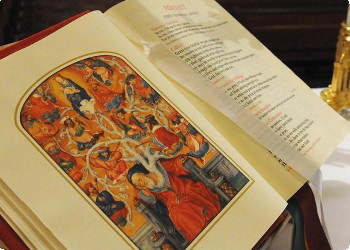The one who treated him with mercy
Dt 30,10-14; Ps 68; Col 1,15-20; Lk 10,25-37
14 JULY
The Church lives the love of the neighbour according to three specific modalities. The first is that of the proclamation of the Gospel to every creature. Every disciple of Jesus, according to the sacrament received and in relation to the charismas of the Holy Spirit, is obliged to proclaim the Gospel to every creature. Everyone must feel obliged to form the body of Christ. This is universal, primary, fundamental, essential and irreplaceable charity. If this first charity is not lived, the others are vain. Then there is organized charity. Being the body of Christ composed of many members, each member must live his personal charity. Organizing charity is the obligation of pastors. If charity is not organized, one will always live in disorder, confusion and injustice.
At that time, as the number of disciples continued to grow, the Hellenists complained against the Hebrews because their widows were being neglected in the daily distribution. So the Twelve called together the community of the disciples and said, “It is not right for us to neglect the word of God to serve at table. Brothers, select from among you seven reputable men, filled with the Spirit and wisdom, whom we shall appoint to this task, whereas we shall devote ourselves to prayer and to the ministry of the word” (At 6,1-4).
Honour widows who are truly widows. But if a widow has children or grandchildren, let these first learn to perform their religious duty to their own family and to make recompense to their parents, for this is pleasing to God. The real widow, who is all alone, has set her hope on God and continues in supplications and prayers night and day. But the one who is self-indulgent is dead while she lives. Command this, so that they may be irreproachable. And whoever does not provide for relatives and especially family members has denied the faith and is worse than an unbeliever. Let a widow be enrolled if she is not less than sixty years old, married only once, with a reputation for good works, namely, that she has raised children, practiced hospitality, washed the feet of the holy ones, helped those in distress, involved herself in every good work. But exclude younger widows, for when their sensuality estranges them from Christ, they want to marry and will incur condemnation for breaking their first pledge. And furthermore, they learn to be idlers, going about from house to house, and not only idlers but gossips and busybodies as well, talking about things that ought not to be mentioned. So I would like younger widows to marry, have children, and manage a home, so as to give the adversary no pretext for maligning us. For some have already turned away to follow Satan. If any woman believer 2 has widowed relatives, she must assist them; the church is not to be burdened, so that it will be able to help those who are truly widows (1Tm 5,3-16).
Faced with a work of charity that demands our immediacy, no rule, either human or divine, has value. First the immediate, impelling charity is accomplished. Then the former journey is resumed. The three modalities obligate every man. Even priests and Levites, bishops, popes, presbyters and lay faithful. Organizing charity is an obligation.
There was a scholar of the law who stood up to test him and said, “Teacher, what must I do to inherit eternal life?” Jesus said to him, “What is written in the law? How do you read it?” He said in reply, “You shall love the Lord, your God, with all your heart, with all your being, with all your strength, and with all your mind, and your neighbour as yourself.” He replied to him, “You have answered correctly; do this and you will live.” But because he wished to justify himself, he said to Jesus, “And who is my neighbour?” Jesus replied, “A man fell victim to robbers as he went down from Jerusalem to Jericho. They stripped and beat him and went off leaving him half-dead. A priest happened to be going down that road, but when he saw him, he passed by on the opposite side. Likewise a Levite came to the place, and when he saw him, he passed by on the opposite side. But a Samaritan traveller who came upon him was moved with compassion at the sight. He approached the victim, poured oil and wine over his wounds and bandaged them. Then he lifted him up on his own animal, took him to an inn and cared for him. The next day he took out two silver coins and gave them to the innkeeper with the instruction, ‘Take care of him. If you spend more than what I have given you, I shall repay you on my way back.’ Which of these three, in your opinion, was neighbour to the robbers’ victim?” He answered, “The one who treated him with mercy.” Jesus said to him, “Go and do likewise.”
Mother of God, Angels and Saints, help us to live charity according to the laws of charity.





